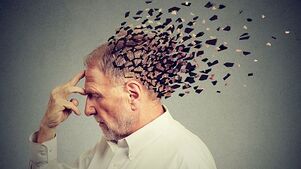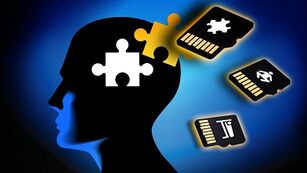
There are opposing views on drugs to improve memory. Some people say that it is useful and helps to deal with increased intellectual stress, it really helps and effectively.
Others say that this is just a myth, that there is no benefit to taking such drugs, that it can even be harmful and addictive for these drugs. Let's try to consider both points of view in more detail and figure out who is right.
A little about memory
Memory is the mental activity of higher neurons, with the help of the accumulation, storage and reproduction of previously received information takes place. Memory allows you to save for a long time information about the world or the body's reactions to any effects and it also allows you to use this information to plan for proper activities in the future.
Memory contains several different but related methods.
- Memorization- content of new data, emotions.
- Storage- data collection, emotions, processing and adaptation. This process allows one to learn, develops one's thinking and speech.
- Reproduction and recognition- a realization of factors, actions, feelings from the past. Reproduction is involuntary (elements "float" in the mind of a person without his will and effort) and arbitrary.
- Forgetting- loss of ability to reproduce and recognize previously mentioned elements. It can be temporary or permanent. It is incomplete forgetfulness, when information is repeated or acknowledged by mistake or in part.
Memory Basics
There are many types and subtypes in my classification. Let's talk about its main types.
- Sensory memory- preservation of information from the senses after stimulating them.
- Touch memory- retention of information from the receiver as a result of touch.
- Motor memory- save information about the movement, many people may remember that there are movements that they perform automatically.
- My semantics- save facts, such as learned stories, dates, multiplication table.
- Short-term memory- save information for a short period of time. Has a small amount.
- Long-term memory- stores information for an indefinite period of time, including your entire life.
Memory Act

Few people know that there are many songs about memory. This is not the author's invention, but an actual pattern confirmed and scientifically proven.
- Repetition law- information will be much better remembered if it is repeated several times.
- Law of Interest- if an individual is interested in information, he will remember it faster and better.
- Edge of the Edge- the information provided at the beginning and end is best remembered.
- The Law of Understanding- if the information has been deeply understandable then it will be better remembered.
- The law of best order length- the amount of information stored should not exceed the amount of short-term memory.
- Installation Law- a person who has given himself the installation that he needs to remember this or that information, will remember it faster and better.
- Laws of inhibition- when similar ideas are memorized, the old information "overlaps" with the new one.
- The Law of Context- when you memorize things that can be linked to already familiar concepts, it goes faster.
- Laws of Action- if what is remembered is used in practice, it will be memorized efficiently and quickly.
These songs can be used if you want to remember something faster and better, as well as to train your memory.
Reasons for amnesia
- Organic brain damage- acute cerebrovascular disease, brain injury, brain tumor.
- Diseases of other organs and systems- diseases of the liver, cardiovascular system.
- External factors- poor ecology, great change in living conditions, stress, sleep disorders.
- Age-related changes in brain structure- decrease in connections within neuropathy.
- Chronic poisoning- smoking, drug use, drug use, alcoholism, drug use (sedatives, sedatives).
Treatment of memory problems
Medicines are not prescribed immediately if memory needs to be improved. First, they try to use non-pharmacological methods. This includes:
- Brisk walks in the fresh air. This increases the supply of oxygen to the brain. This improves the efficiency of their work.
- Normalize sleepand wakefulness.
- Evening training- the practice of reviewing all the events of the day in reverse order, it is first to remember what happened in the evening and in the end - the morning events can become unusual training. It is better to do this before going to bed, lying in bed.
- Positive attitude, do not dwell on it- do not think you have a bad memory, no one can stop the effects of self-hypnosis. If you can never remember something, do not worry, do not get angry, just let yourself be misled, do something else and try again to remember what you forgot.
- Daily exercises- solve crossword puzzles, puzzles, scan words.
- Education- learn poetry, foreign language, do it regularly, gradually increase the content you learn.
Drugs for amnesia

It is clear that learning poetry, a foreign language, solving puzzles is not easy, you need to "stretch", walking and solving puzzles should be given extra time that a working person has almost no.
It's much easier to take a pill, calm down and hope that the magic of the drug - your memory will immediately recover and you do not have to do anything! The modern city dweller is so lazy and corrupt by the fruits of civilization that now few are so purposeful and want to spend their time and energy training memory. So one is looking for an answer to his question - what pills to improve memory are there?
So let's consider two opposing views on this issue:
Positive feedback
Proponents of the use of these drugs say that a number of drugs help to improve blood flow to brain cells, thereby improving their nutrition and providing more oxygen, which improves the metabolic process in neurons.
Nootropics and drugs that improve the rheumatic properties of blood help with this.
Herbal preparations have become widespread, which not only improve the metabolic processes in neurons by themselves, but also increase the effects of drugs.
But it should be borne in mind that any drug (exactly any drug) has contraindications and side effects, so it should only be prescribed by a doctor in each clinical case.
Negative opinion
According to a number of experts, there is also a disadvantage to the currency. A few years ago, experts were puzzled by the question - are these drugs effective or are they just placebo effects?
As a result of numerous studies, the efficacy of nootropics has not been established. There is no evidence that it has a positive effect on memory. One small study on the effectiveness of drugs has shown that they have little effect but not in severe cases.
Traditional methods and herbal remedies such as ginseng, vitamin E, have almost no research. The database is for herbal use only in patients with dementia. But there is no information on the effectiveness of use in relatively healthy people.
Finally, I want to say that when you think about which drugs are best for improving memory, do not forget that your doctor should prescribe them. And your doctor should also evaluate the effectiveness in each case. Do not rely on advice from friends, neighbors or relatives.
If you think your memory has deteriorated, consult a neurologist. Maybe this is not the problem at all, attention can be disturbed, there can be some other problem. It is also necessary to find out the cause of this condition. And this can only be done by a qualified doctor.







































































